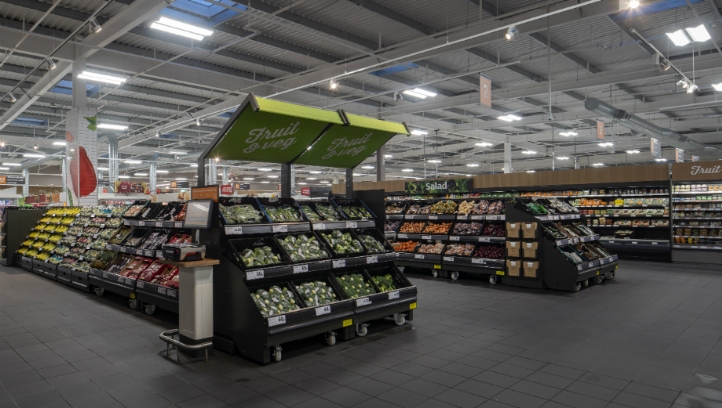Sainsbury’s has pledged to remove all single-use plastic bags from its fruit, vegetable and produce lines by September, in what it claims will be a first for a UK supermarket.

The switch will be made immediately for produce aisles, and by September for in-store bakeries
The bags will be removed from all of the supermarket’s produce aisles with immediate effect, with customers encouraged instead to bring their own reusable containers or to purchase a 100% recycled and reusable alternative.
The phase-out of plastic bags in in-store bakeries, meanwhile, will be completed in September. Bags in this department will be replaced with paper alternatives.
Sainsbury’s said the move comes as part of a bid to “double its efforts to cut plastic waste”. The company had previously committed to removing 1,280 tonnes of virgin and hard-to-recycle plastics from its packaging portfolio this year, but has now upped this figure to 2,564 tonnes.
As it strives to meet this commitment, Sainsbury’s will remove the plastic cutlery currently offered in its cafes and at checkouts with wooden alternatives. It will also stop producing plastic trays for asparagus, tomatoes, sweetcorn and carrots; plastic lids for ice cream pots; plastic egg trays and plastic sleeves for pots of herbs.
“Our customers expect us to be leading the way on major issues like this, so I am determined to remove and replace plastic packaging where we can and offer alternatives to plastic where packaging is still required to protect a product,” Sainsbury’s’ chief executive Mike Coupe said.
Sainsbury’s is notably a member of WRAP’s UK Plastic Pact and is thereby bound to ensure all plastic packaging is reusable, recyclable or compostable by 2025. Since signing the pact, it has committed to removing black and other dark plastics, which are not detectable in traditional recycling infrastructure, from its own-brand portfolio by March 2020.
Industry-wide shifts
In related news, Aldi has today (10 June) announced that it will begin trialling paper and compostable carrier bags across its entire UK estate of 830 stores, in a bid to gauge consumer attitudes to the two alternatives to virgin plastic.
From July, half of the chain’s UK stores will offer paper carrier bags, retailing at 19p each, and the rest will offer biodegradable bags, retailing at 6p each.
Aldi claims that the biodegradable bags will completely degrade outside of industrial conditions within 12 months. It additionally claims that the paper bags will be strong enough to carry 11kg of groceries and will be made from pulp sourced from sustainably managed forests.
Throughout the trial, its regular plastic “bags for life” will continue to be placed at checkouts, retailing at 10p. Sturdier plastic options, including chill bags, will also continue to be offered. At the end of the trial, either the paper or biodegradable bags will be made a permanent fixture at all Aldi UK stores.
“Cutting waste is part of Aldi’s DNA and we are constantly looking for new ways to reduce our environmental impact,” Aldi’s managing director of corporate responsibility Fritz Walleczek said. “This new trial is one of the biggest we have ever launched because we want our customers to be involved and help us make the right decision for them and the environment.”
The move builds on Aldi’s sweeping array of plastic pledges, which were unveiled last March as part of an update to its sustainability strategy.
Commitments include a ban on single-use plastic bags, with all 5p bags having been removed from Aldi UK stores as of January, and a pledge to ensure all packaging on its own-label is reusable, recyclable or compostable before 2022. Since setting these ambitions, Aldi UK has replaced more than 2,500 tonnes of hard-to-recycle plastics with recyclable alternatives.
To complement the alternative bag trials, Aldi has this week added two new pledges to its strategy – reducing its total plastic packaging footprint (by weight) by 25% by the end of 2023 and removing all “hard-to-recycle” plastics such as PVC, expanded polystyrene and black plastic from its core food range by the end of 2020. It has already begun removing black plastics from its produce lines and has replaced its expanded polystyrene pizza discs with cardboard alternatives.
Sarah George
